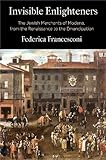Invisible Enlighteners : The Jewish Merchants of Modena, from the Renaissance to the Emancipation / Federica Francesconi.
Material type: TextSeries: Jewish Culture and ContextsPublisher: Philadelphia : University of Pennsylvania Press, [2021]Copyright date: 2021Description: 1 online resource (400 p.) : 10 halftones, 5 line artContent type:
TextSeries: Jewish Culture and ContextsPublisher: Philadelphia : University of Pennsylvania Press, [2021]Copyright date: 2021Description: 1 online resource (400 p.) : 10 halftones, 5 line artContent type: - 9780812299625
- Jewish merchants -- Italy -- Modena -- History -- 17th century
- Jewish merchants -- Italy -- Modena -- History -- 18th century
- Jews -- Italy -- Modena -- History -- 17th century
- Jews -- Italy -- Modena -- History -- 18th century
- HISTORY / Jewish
- 16th 17th century Modena Italy
- Ashkenazi
- Camillo Jaghel da Correggio
- Discorso of Moisè Formiggini
- Early Modern Jewish Culture history
- Este
- Ferrara
- Jewish Diaspora
- Laudadio Formiggini
- Miriam Rovigo
- Modena Ghetto
- Modenese Jewish merchants Mercantile Elite
- Moisè Modena
- Opera Pia dei Catecumeni
- Simone Luzzatto
- Soed Holim
- humanism
- philosophy
- renaissance
- 381.089/924045421 23/eng/20230216
- online - DeGruyter
| Item type | Current library | Call number | URL | Status | Notes | Barcode | |
|---|---|---|---|---|---|---|---|
 eBook
eBook
|
Biblioteca "Angelicum" Pont. Univ. S.Tommaso d'Aquino Nuvola online | online - DeGruyter (Browse shelf(Opens below)) | Online access | Not for loan (Accesso limitato) | Accesso per gli utenti autorizzati / Access for authorized users | (dgr)9780812299625 |
Frontmatter -- Contents -- Note on Spelling, Translations, and Currency -- Map -- Introduction -- Chapter 1 A Network of Jewish Families in the Early Modern Period The Road Toward Ghettoization -- Chapter 2 Jewish Leaders, Their Circles, and Their Books Before the Inquisition A Parallel Story -- Chapter 3 The Jewish Household Family Networks, Social Control, and Gendered Spaces -- Chapter 4 The “Invisible” Wealth of Silver The Journey of the Formigginis from the Ghetto to the Ducal Court -- Chapter 5 Jewish Female Agency in the Ghetto Mercantile Elite -- Chapter 6 The Jewish Urban Geography of the Ghetto and Beyond -- Chapter 7 Moisè Formiggini Before Napoleon Two Steps Toward Emancipation and One Step Back -- Abbreviations -- Notes -- Bibliography -- Index -- Acknowledgments
restricted access online access with authorization star
http://purl.org/coar/access_right/c_16ec
Federica Francesconi writes the history of the Jewish merchants who lived and prospered in the northern Italian city of Modena, capital city of the Este Duchy, during the seventeenth and eighteenth centuries. Her protagonists are men and women who stood out within their communities but who, despite their cultural and economic prominence, were ghettoized after 1638. Their sociocultural transformation and eventual legal and political integration evolved through a complex dialogue between their Italian and Jewish identities, and without the traumatic ruptures or dramatic divides that led to the assimilation and conversion of many Jews elsewhere in Europe.In Modena, male and female Jewish identities were contoured by both cultural developments internal to the community and engagement with the broader society. The study of Lurianic and Cordoverian Kabbalah, liturgical and nondevotional Hebrew poetry, and Sabbateanism existed alongside interactions with Jesuits, converts, and inquisitors. If Modenese Jewish merchants were absent from the public discourse of the Estes, their businesses lives were nevertheless located at the very geographical and economic center of the city. They lived in an environment that gave rise to unique forms of Renaissance culture, early modern female agency, and Enlightenment practice. New Jewish ways of performing gender emerged in the seventeenth century, giving rise to what could be called an entrepreneurial female community devoted to assisting, employing, and socializing in the ghetto. Indeed, the ghetto leadership prepared both Jewish men and women for the political and legal emancipation they would eventually obtain under Napoleon. It was the cultured Modenese merchants who combined active participation in the political struggle for Italian Jewish emancipation with the creation of a special form of the Enlightenment embedded in scholarly and French-oriented lay culture that emerged within the European context.
Mode of access: Internet via World Wide Web.
In English.
Description based on online resource; title from PDF title page (publisher's Web site, viewed 19. Oct 2024)


